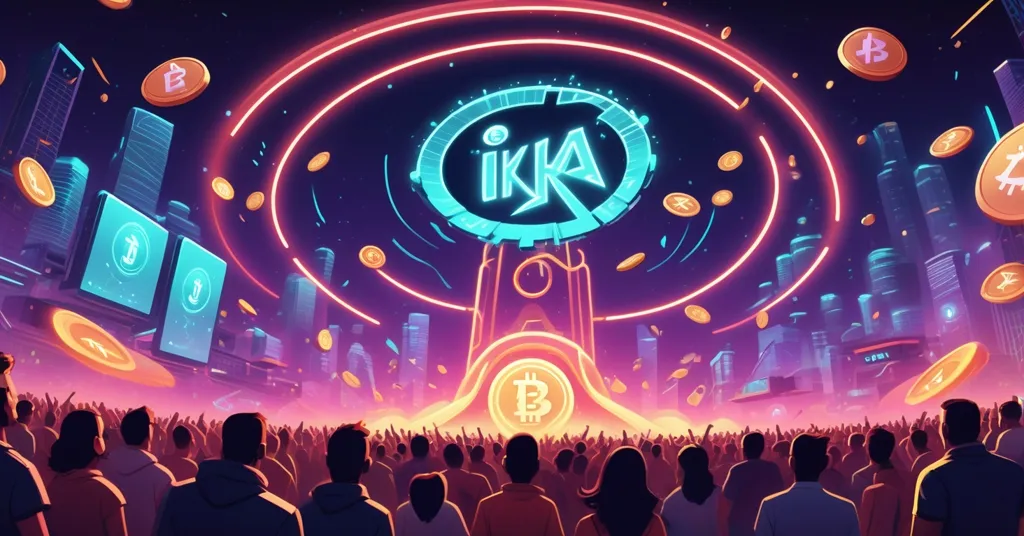Ika (IKA) Skyrockets to $261M on Gate Launchpad: Hidden Gem or Hype Trap?

Ika (IKA) Surges to $261 Million on Gate Launchpad: Hype Machine or Hidden Gem?
The crypto world is abuzz with the meteoric rise of Ika (IKA), a new token that’s pulled in over $261 million in subscription volume in just 24 hours on Gate Launchpad, a fundraising platform tied to the Gate.io exchange. This kind of overnight success is turning heads, but it’s also raising eyebrows. Is this a pioneering project poised to redefine a niche, or just another speculative bubble ready to pop?
- Eye-Popping Stats: Ika (IKA) amassed over $261 million in subscriptions in a single day on Gate Launchpad.
- Platform Push: Gate Launchpad, a hub for emerging tokens, fueled this unprecedented surge.
- Boom or Bust: The numbers scream hype, but sustainability and fundamentals are still in question.
Why This Matters
A $261 million subscription haul in under a day isn’t just a statistic—it’s a snapshot of the crypto market’s wild energy and appetite for the next big thing. For newcomers, this is a glimpse into how fast money moves in blockchain circles. For seasoned OGs, it’s a reminder of both the opportunities and the pitfalls that define this space. Whether you’re a curious bystander or a hardcore Bitcoin maximalist, the Ika (IKA) launch on Gate Launchpad demands attention, if only to separate fact from frenzy.
Decoding the Ika (IKA) Launch: What We Know (and Don’t)
Gate Launchpad operates as a springboard for blockchain startups, letting them raise capital by selling tokens to a wide pool of investors. It’s like a community-funded launchpad for crypto projects, where early backers can grab tokens at potentially low prices before they hit broader markets. The debut of Ika (IKA) through this platform has smashed records, raking in over a quarter-billion dollars in subscription volume in just 24 hours. That’s the kind of traction that makes even the most jaded crypto veteran sit up and take notice.
But here’s the kicker: we know shockingly little about what Ika (IKA) actually is. Public information on its mission, technology, or use case is frustratingly thin. Is it a decentralized finance (DeFi) protocol looking to shake up lending? A gaming token tied to some flashy metaverse project? Or something completely off the radar? Without a whitepaper, roadmap, or official statements widely available at this time, we’re piecing together a puzzle with half the pieces missing. This opacity is a massive red flag, and any investor worth their salt should be pounding the table for transparency before throwing a dime at this.
Some context comes from Gate Launchpad’s track record. Their earlier project, Puffverse (PFVS), launched in May 2025, pulled in over 6.56 billion USDT in investment—200% above its target. Puffverse, a GameFi project blending NFTs and metaverse elements, drew over 35,000 users, many new to crypto. If Ika (IKA) is riding a similar wave, it’s likely tapping into a trendy niche where investor FOMO (fear of missing out) often burns brighter than fundamentals. Gate’s low entry barriers—sometimes as little as 1 USDT to participate—make it easy for retail investors to jump in, driving these insane subscription numbers. But let’s be blunt: easy access can also mean a flood of clueless capital chasing the latest shiny toy. For more on Gate’s history with projects, their token sale mechanics and reputation offer some insight.
The Upside: A Spark for Decentralized Innovation?
As someone who often leans toward Bitcoin maximalism, I’m naturally skeptical of every altcoin that pops up promising to be the next big thing. Bitcoin is the undisputed king of decentralized money—a battle-tested store of value with unmatched security and principles. But I’ll concede this: it doesn’t, and shouldn’t, do everything. Ethereum brought smart contracts to the party; other protocols have pushed the envelope in gaming, DeFi, and niche use cases. If Ika (IKA) has a real value proposition, this $261 million surge could mark the arrival of a legitimate player in the Web3 space. Gate’s status as a major exchange also adds a thin layer of credibility—surely they’ve done some vetting to filter out the most obvious scams, right? Check out some of their past success stories for perspective.
More than that, this event underscores the raw power of decentralized fundraising. Unlike the stuffy old venture capital world where a few suits pick winners and losers, platforms like Gate Launchpad let the crowd decide with their wallets. It’s chaotic, often messy, and sometimes a total trainwreck, but it’s also a middle finger to centralized gatekeepers. We’re all about financial freedom here, and if Ika (IKA) delivers on its (still unclear) promises, it could be a poster child for effective accelerationism—speeding us toward a future where traditional power structures are irrelevant. Even if it’s just a niche player, it might drive adoption in ways Bitcoin was never meant to.
Why $261 Million Might Be Fool’s Gold
Before we get swept up in dreams of Web3 utopia, let’s slam on the brakes and face some ugly truths. A $261 million subscription volume in 24 hours doesn’t mean Ika (IKA) is destined for glory—it often signals a mob of speculators hoping to flip tokens for a quick profit. The crypto graveyard is stuffed with projects that spiked on launch day only to tank when the hype died. Remember the 2017 ICO madness? Or more recent initial DEX offerings (IDOs)? Countless tokens promised to revolutionize everything but ended up as rug pulls or ghost towns. Without hard info on Ika (IKA)’s team, tech, or tokenomics (the economic model behind a token’s supply, distribution, and incentives), we’re gambling blind. Are there safeguards against token inflation? What’s the vesting schedule (the timeline for releasing insider tokens) to prevent early dumps? Do whales hold a massive chunk, poised to crash the market? These aren’t nitpicky details—they’re the line between a project with staying power and a glorified Ponzi. For a deeper dive into the risks, consider this analysis of hype-driven token launches.
Gate Launchpad’s history isn’t flawless either. While their audits aim for a project survival rate above 85% (similar to platforms like DAO Maker), that still leaves plenty of room for flops. And let’s talk market mechanics—crypto is speculation on steroids. When subscription volumes hit these levels, it often sparks “gas wars” (think bidding frenzies where users pay higher fees to secure tokens, often squeezing out smaller players) or bots sniping allocations before regular folks can act. Gate has experimented with fixed-price pools to level the playing field, but whether that applied here is anyone’s guess. If you’re tossing cash at Ika (IKA) without digging into the gritty details, you’re not investing—you’re playing crypto roulette with a rigged wheel and no refunds.
Oh, and watch out for the vultures. Scammers love launches like this. If you see fake Twitter handles or Telegram groups hyping “IKA to the moon” with absurd 100x predictions, steer clear. We’ve got no patience for that garbage. Crypto is already fighting for mainstream legitimacy; the last thing we need is more snake oil peddlers. If you spot bullshit price predictions or trade analysis that sounds like a fairy tale, call it out. It’s probably just shilling anyway.
Echoes of the ICO Boom: A History Lesson
To put Ika (IKA)’s surge in perspective, let’s rewind to the 2017-2018 ICO boom, when “initial coin offerings” were the hottest ticket in town. Thousands of projects raised billions—some legit, most not. Bitconnect, for instance, promised guaranteed returns through a “lending platform” that turned out to be a textbook Ponzi scheme, collapsing in 2018 and wiping out investors. OneCoin, billed as a Bitcoin killer, raised over $4 billion before being exposed as a scam with no blockchain at all. Studies later showed over 80% of 2017 ICOs failed within two years, per CoinDesk data. Fast forward to today, and while launchpads like Gate have tighter controls, the core risk remains: hype often drowns out due diligence. Ika (IKA)’s $261 million haul feels eerily familiar. Is this a repeat of history, or has the space matured enough to avoid those traps? Only time—and a hell of a lot of research—will tell. For broader context on cryptocurrencies, check this detailed overview.
What If Ika (IKA) Is the Real Deal?
Let’s play devil’s advocate for a moment and imagine the best-case scenario. What if Ika (IKA) isn’t just hype but a genuine innovator? Suppose it’s a scalable DeFi protocol solving real pain points like high transaction costs or cross-chain interoperability. Or maybe it’s a GameFi token with a killer app that pulls millions into blockchain gaming. If whispers of a team stacked with ex-Ethereum devs or industry heavyweights are true, this could be a sleeper hit. A $261 million start would then be less a bubble and more a launchpad (pun intended) for something transformative. Even as a Bitcoin maximalist, I’d tip my hat to that—Bitcoin can’t do it all, and true innovation accelerates the broader mission of decentralization. But without proof, this is just a pipe dream. Show us the goods, Ika. If you’re curious about community opinions, there’s ongoing chatter in various online forums.
Zooming Out: How Launchpads Are Evolving
Ika (IKA)’s moment didn’t happen in a vacuum—it’s part of a broader shift in how crypto projects get off the ground. Launchpads like Polkastarter, DAO Maker, and Seedify have evolved from simple fundraising tools into full ecosystems for incubation and community building. Polkastarter supports cross-chain liquidity on networks like Ethereum, BNB Chain, and Polygon for maximum reach. DAO Maker’s Strong Holder Offerings (SHO) reward loyal investors with better access to sales. Seedify hones in on GameFi and metaverse projects with specialized Initial Game Offerings (IGOs). Gate Launchpad fits this trend, blending accessibility with features like Puffverse’s dual-token model to curb inflation or SDK plans for third-party integration.
Today’s launchpads aren’t just about raising funds—they’re about creating lasting value and sticky communities. Regulatory pressures, like SEC scrutiny in the U.S., have also forced platforms to adapt with KYC (know your customer) requirements and staking mechanisms to weed out bad actors. For Ika (IKA), the question is whether it’s leveraging Gate’s infrastructure for genuine growth or merely surfing a wave of market fever. If you’re thinking of jumping in, take a hard look at Gate’s reputation, the project’s fundamentals (if you can find them), the token economics, and community sentiment on platforms like Discord or Twitter. If it doesn’t pass muster, it’s just noise in an already crowded space. For a different perspective on Ika’s massive haul, here’s an in-depth subscription analysis.
How to Vet a Token Launch Like Ika (IKA)
Navigating launches like this isn’t for the faint of heart, but a little homework goes a long way. Here’s a quick checklist to cut through the hype and assess whether Ika (IKA)—or any new token—deserves your hard-earned cash:
- Check for a Whitepaper: Look for an official document on the project’s website or Gate’s platform outlining the tech, use case, and roadmap. No whitepaper? No investment.
- Research the Team: Dig into the founders and developers on LinkedIn or GitHub. Are they legit, with a track record in blockchain, or faceless nobodies? Anonymity isn’t always a dealbreaker, but it’s a risk.
- Analyze Token Distribution: Look for red flags like heavy insider allocations or short vesting periods that could lead to dumps. Fair distribution matters.
- Monitor Community Vibe: Check Twitter, Reddit, or Discord for real engagement versus bot-driven hype. A strong, organic community is a good sign; paid shills are a warning.
- Assess Utility: Does the token solve a real problem, or is it just a speculative asset? If there’s no clear use case, walk away.
This isn’t rocket science, but it’s the difference between building wealth and burning it. Bitcoin’s slow, organic growth over a decade—forged through hacks, crashes, and skepticism—stands in stark contrast to Ika (IKA)’s overnight splash. Which model do you trust more? If you’re still puzzled about what Ika even represents, there are discussions on platforms like Q&A sites that might offer some context, though not always directly related to crypto.
Key Questions and Takeaways
- What is Ika (IKA), and what’s its purpose in the crypto ecosystem?
Public details on Ika (IKA)’s goals, tech, or use case are scarce right now. Whether it’s DeFi, GameFi, or something else remains unclear without a whitepaper or official info. Investors should hunt down primary sources before making moves. - How did Ika (IKA) rack up over $261 million in subscriptions so fast?
The surge likely comes from market hype, Gate Launchpad’s low entry barriers, and possibly a hot niche like gaming or metaverse. Gate’s large user base and credibility boost interest, though speculative FOMO is a major driver. - What risks come with such a rapid subscription spike for Ika (IKA)?
Dangers include wild volatility, potential pump-and-dump schemes, and unproven utility. Lack of transparency on tokenomics or team background fuels uncertainty, and oversubscription often leaves retail investors with scraps. - What’s Gate Launchpad’s role in this, and how reliable is their platform?
Gate Launchpad enables token sales with wide access, as seen with Puffverse’s $6.56 billion oversubscription. While their audits and liquidity are solid, not every project thrives—personal research beyond platform trust is critical. - Why should Bitcoin fans care about a launch like Ika (IKA)?
Bitcoin rules as decentralized money, but altcoins can innovate in spaces BTC doesn’t touch. If Ika (IKA) brings real value, it’s worth noting; if it’s pure speculation, it’s a sideshow to Bitcoin’s core mission.
Final Thoughts: Keep Your Wits About You
The $261 million surge of Ika (IKA) on Gate Launchpad captures the untamed spirit of the crypto frontier—a space where fortunes are made and lost in a heartbeat. It’s a loud reminder of why we’re here: to build a decentralized financial system that spits in the face of centralized overlords. But it’s also a blaring siren to proceed with caution. Hype is a hell of a drug, and the crypto landscape is littered with here-today-gone-tomorrow scams. For every true innovator, there are dozens of quick-buck artists waiting to fleece the unwary. So, whether you’re a wide-eyed newbie or a grizzled OG, dig deep into Ika (IKA). Demand answers. Challenge the narrative. If something smells off, don’t hesitate to say so. We’re in this to push for a freer, better future—not to pad the wallets of fast-talking grifters. Let’s keep it honest and keep building.


